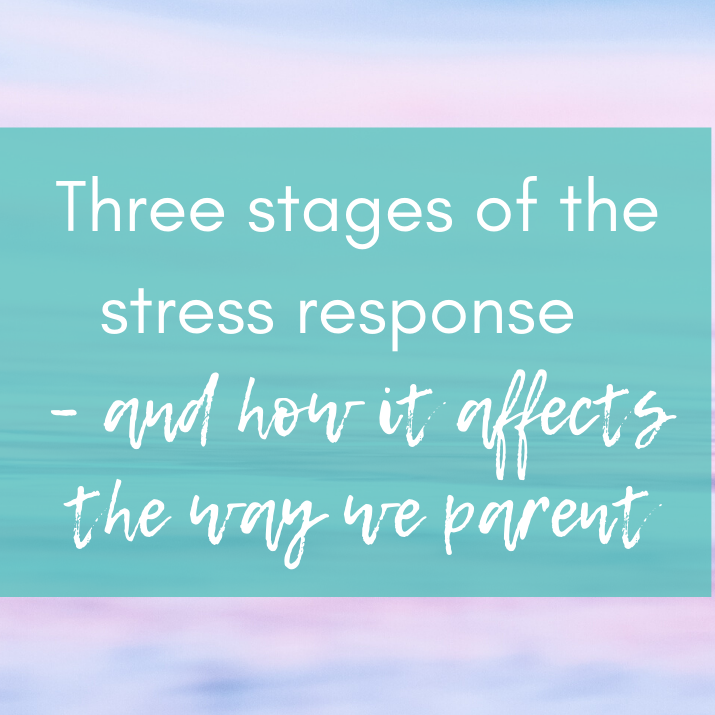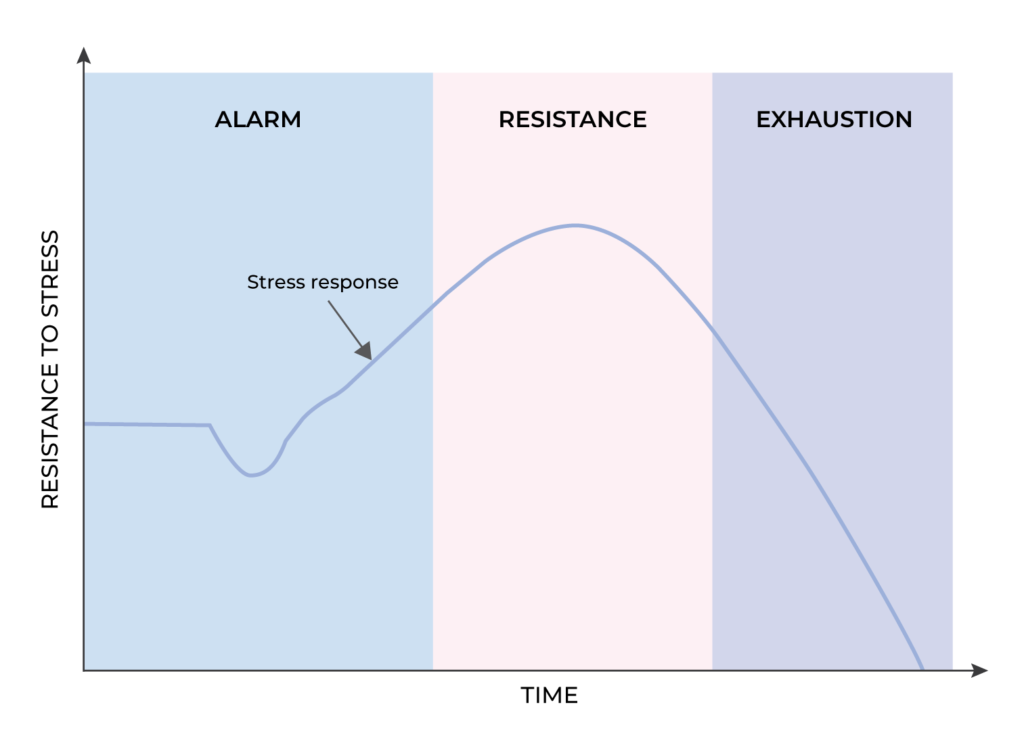
This post is part of a series on how we can manage the stress of family life. You can find other posts in the series by clicking here.
Stress is something we hear/read a lot about and personally experience but do we really know what stress is?
Stress is the way we react to any change that requires an adjustment or response. We may react to these changes with physical, mental, and emotional responses. Stress is a part of life and as I have noted previously not all stress has a negative effect on us.
What is eustress?
Eustress or positive stress is where we are being sufficiently challenged but we are not expending all of our physical, mental, and emotional resources. Some examples of eustress are:
- travelling – to countries with different languages and customs
- studying – a new qualification which you are tested
- public speaking – to small or large groups of people
- new work projects – that take you out of your comfort zone and require you to learn new skills or improve existing ones
- setting new performance standards – in competitive sports or a fitness activity
- setting personal goals – goals that challenge your skills and abilities but are realistic
However, when we say we are feeling stressed or stressed out, eustress is generally not the type of stress we are referring to. The stress we are referring to can be known as distress.
Distress

Distress is where we are being challenged beyond our physical, mental, and emotional resources. This can be either acute or chronic as defined by the American Psychological Association:
- Acute stress, the most common form of stress, is short-term and stems from the demands and pressures of the recent past and anticipated demands and pressures of the near future (APA, 2011).
- Chronic stress, a long term form of stress, derives from unending feelings of despair/hopelessness, as a result of factors such as poverty, family dysfunction, feelings of helplessness and/or traumatic early childhood experience (APA, 2011). Chronic stressors associated with health disparities include perceived discrimination, neighborhood stress, daily stress, family stress, acculturative stress, environmental stress and maternal stress (Djuric et al, 2010; NIH, 2011).
How do we respond to stress?
The body’s short-term and long-term reaction to stress is described as general adaptation syndrome. General adaptation syndrome (GAS) is a three-phase reaction to stress as seen in the below diagram:

Diagram: based on the General Adaptation Syndrome (GAS) model created by David McQuillan.
Alarm Reaction Phase
This is our initial experience of the stress; it could be work pressures, family pressures, physical stress from the demands of training, or emotional stress from challenging relationships. The body accounts for all this stress in the same way regardless of its source.
During the alarm reaction phase, the stressor disturbs homeostasis – this is the dip in the diagram above. Homeostasis is a point of balance or internal biological equilibrium, you are feeling good and everything is okay. The disruption causes the infamous fight or flight response to kick in – this is the significant uptick in our resistance to stress in the first third of the diagram. Physically this means our heart rate increases, our adrenal gland releases cortisol (a stress hormone), and we receive a boost of adrenaline, which increases energy.
Resistance (adaptation) Phase
In the Resistance (adaptation) Phase the body tries to counteract the physiological changes that happened during the alarm reaction phase where we were either fighting or fleeing. This phase releases a lower amount of cortisol, and our heart rate and blood pressure begin to normalise. This is represented by the gradual increase in resistance to stress in the middle third of the diagram.
Although our body enters the recovery phase, it is still on high alert for a little while. If the stressful situation comes to an end during this phase, then our body will then return to normal and our hormone levels, heart rate, and blood pressure reach a pre-stress state. We go back to the first third of the diagram. But, if the stressor remains or we haven’t been able to deal effectively with the stress, our body stays in a state of alert, and stress hormones continue to be produced. If the resistance phase continues for too long without any relief to offset the effects of stress, it can lead to the exhaustion phase.
Exhaustion Phase
After an extended period of stress, our body goes into the final phase of the general adaptation syndrome – the last third in the diagram. We can only fight or flee for so long before it begins to wear down our capacity to resist and deal with stress. Our body has depleted its energy resources by continually trying but failing to recover from the initial alarm reaction phase.
Why it is so important to manage the stress in our lives?

Struggling with stress for long periods can drain our physical, emotional, and mental resources to the point where our body no longer has the strength to fight stress. This is where we are spending lots of time in the exhaustion phase of the stress response and it can see us experience:
- fatigue
- burnout
- depression
- anxiety
- feeling unable to cope
- decreased stress tolerance
While managing stress is critical for everyone, mums and dads need to really take particular care as the flow-on effects of a stressed-out parent on the child is significant. This article dives deep into the research and science about stressed parents, but from personal experience, most of us would know how stress impacts our ability to parent.
Many of you shared how stress affects the way you parent in my 2020 annual reader survey. The below table is just a selection of the over 650 responses I received:
| How does being stressed affect the way you parent? |
|---|
| Being short and unavailable |
| Being short with kids, not engaging with them, poor food choices |
| Children get stressed too. |
| Children misbehave more |
| Distracted, I feel like I am get sick easier too. |
| Don't have as much energy/attention for the kids as I would like. |
| Don’t have energy and forget things which impacts routine and organisation |
| Everyone in my family is stressed and anxious if I’m stressed and anxious |
| Get very tired overwhelmed then I disconnect |
| I am a lot more ‘shouty’ and angry than I would like to be. |
| I am angry a lot and very shouty |
| I am less conscious and more explosive than I want be |
| I am less patient, less thoughtful and tend to be reactive rather than I should & prefer to be |
| I am not the mother I want to be |
| I am not the parent I wish to be when stressed |
| I am short with the kids over little things and then I regret it |
| I become grumpy, and don't enjoy the moment with my kids |
| I become impatient, quick to anger and then give myself a really hard time! |
| I become yelling mummy (which makes me more stressed because I then feel guilty I’m not parenting how I really want to) |
| I detach more |
| I don't meet the kids needs rightly. I lose my cool and overreact. |
| I get frustrated more easily, my patience wears thin, I snap faster, find it harder to control/regulate my emotions & responses |
| I react rather than respond. I parent out of irritation rather than in a desire to help them |
| I retreat from my family |
| I run out of energy to do everything that needs to be done in our household |
| I'm not the best me I can be. |
| I’m less patient and present - I’m not always the Mum I thought I’d be which saddens me |
| I’m more impatient and less present (mentally) |
| It effects my whole being which impacts on the whole family |
| It heightens the stress of the family |
| Less patience, more reactive to behaviour |
| Less patient, more angry, then guilty |
| Makes me angry, impatient and shouty. I really hate that. |
| Reduces my ability to be as present and patient as I would like to be |
To summarise:
- we don’t have the patience we would like – we overreact to small issues, raise our voice more than we would like
- we are not present with our kids
- stress is contagious – kids pick up on our stress levels and this changes their behaviour and attitude
How can we manage stress better?

In an ideal world, we would only have eustress and the stress we have in our life would not have a negative impact on us or our kids. But life can be stressful, so we need to find ways to manage stress so as to decrease the impact it has.
I have already shared in these posts some ways to manage stress with planning:
- Tips for smooth(er) school mornings
- Using planning to reduce stress in family life – kid stuff part 1
- Using planning to reduce stress in family life – kid stuff part 2
Over the next couple of weeks I will share ideas on how we can manage ourselves and use nature to help us cope and adapt to stress better so we can be the parents we want to be.
